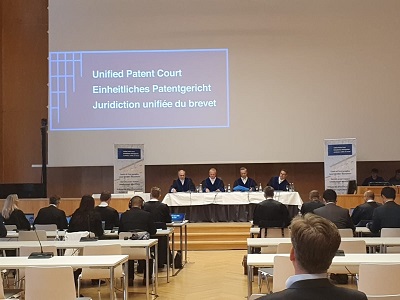How 37 patent firms made it into JUVE Patent’s first UPC litigation ranking
JUVE Patent's first UPC litigation ranking 2025 provides a clear picture of which law firms have already established a reputation at the new Unified Patent Court after one and a half years of litigation. The feedback from in-house counsel inside and outside Europe was plentiful and detailed, enabling an initial market overview.
11 December 2024 by Christina Schulze
A total of 37 law firms have met the tough criteria to make it into JUVE Patent’s first ever UPC litigation ranking. The field is as diverse as the proceedings that have already been brought to the UPC so far. From lawsuits between national medium-sized companies in markets for specialist technologies such as mechanics, to extensive FRAND disputes between globally active competitors.
Market leaders
Firms that have established themselves as market leaders in the UPC’s first year and a half include purely national IP litigation boutiques such as Kather Augenstein, as well as international law firms such as Bird & Bird and Taylor Wessing.
Bardehle Pagenberg, whose German office is particularly strong, has boasted a significant presence at the court since its inception and has thus gained a toehold at the top of the market with its mixed line-up.
Surprises close behind
However, detailed analysis of the law firms active at the UPC reveals some surprises. For example, those hot on the heels of the market leaders include law firms such as Hogan Lovells, Hoyng ROKH Monegier and Simmons & Simmons. Many of these began preparing strategically and extensively for the UPC at an early stage. The boutiques Vossius and Brinkhof, which are among the top firms in their national markets, formed an alliance for the UPC in a much shorter period of time compared to Hoyng ROKH Monegier, for example.
The UK boutique Powell Gilbert has also made an equally successful start to UPC litigation. A large number of its UK solicitors are registered and active as UPC representatives via its Dublin office. Core clients such as Edwards Lifesciences and Asus call on the firm as coordinator for UPC litigation.
Close calls
UK competitor Bristows has been heavily involved in the development of the UPC, but is currently retained for surprisingly few UPC cases and has therefore not made it into the ranking.
The presence of patent attorney firms in the UPC is varied. Firms such as Cohausz & Florack and Maikowski & Ninnemann are, as expected, already highly involved in UPC litigation. Large patent attorney firms outside Germany, on the other hand, have had a much slower start at the UPC. This includes Plasseraud and Casalonga, even though they, like Regimbeau with Gide, forged an alliance for the new court.

© Mathieu Klos/JUVE Patent
The latter examples show that not every cooperation is immediately successful. Rather, the good reputation of the German courts and their plethora of cases have probably given the German local divisions a jump start. Clients have shown a certain trust and preference for these divisions.
If local divisions in other countries increase their case numbers significantly over the next few years, other law firms, such as August Debouzy in Paris or the Italian boutique Trevisan & Cuonzo, could rise in the rankings.
Mid-sized firms included
Law firms that are active at divisions outside their home countries without local counsel or active networks also made surprising headway. The patent attorneys of the Austrian boutique Torggler & Hofmann, for example, already have a greater presence than many of their competitors with their proceedings for SMEs.
Overall, medium-sized companies embraced the UPC from the outset. These initiate patent litigation when they can benefit from the regional reach of the court’s rulings. Numerous law firms thus maintain close contacts with such companies, with Meissner Bolte, CBH, and Preu Bohlig, for example, already having many cases.
Interestingly, mixed outfits such as Eisenführ Speiser and Peterreins Schley have won their clients over for UPC cases in mobile communications disputes alongside established law firms such as Kather Augenstein.
International clients, especially from the US, but also companies based in the UPC area, have filed cases at the UPC, enabling JUVE Patent to collect extensive and meaningful feedback. One topic came up time and again: The difficulty in predicting the outcome of the proceedings. There are still too few judgments available to do this with any certainty, but this is one issue that time alone will solve.
